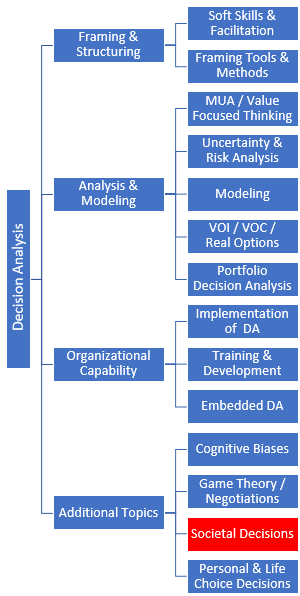DecisionPedia - Societal Decisions
Societal Decisions
Click on any block to access a topic
|
Societal Decisions: Societal decisions are everywhere and affect everyone. From from health care and education to public safety and the environment, it takes little more than a flip through a local newspaper to find examples of decisions that impact society. What makes Societal Decisions unique? Societal decisions differ from business and personal decision problems in several ways, including:
Best practice examples:The links below highlight examples and best practices where decision professionals have added significant value to societal decisions.
If you have any questions, comments, or suggestions for additional examples, please send us an email. All Library Resources for this topic |


